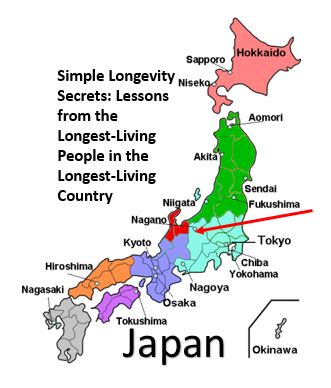The surprising story of Japan’s Nagano Prefecture, once plagued by high blood pressure and strokes, now known for longevity among both women and men
The Japan Times recently published an article on “How Japan’s saltiest residents came to live the longest“, an interesting twist for those who credit Japan’s longevity to a diet filled with fish. Nagano Prefecture is a land-locked area, once known for digesting high levels of salt (used to preserve foods during long winters). Some of its most famous foods are preserved and pickled foods and a salty miso. So, how did this region go from being plagued by high blood pressure and strokes as recently as the 1960s to the highest levels of longevity in the world?
The solutions might surprise you! This story proves that people can make small changes that can make a dramatic difference in longevity (and quality of life). The area began tackling the issue by first focusing on the high salt diet, encouraging residents to make realistic changes. For example, instead of eating the salty miso soup with each meal, residents could cut back to once/day.
By adding more fresh vegetables (which refrigeration had made possible), people could still eat favorite foods but reduce the salt in their overall diets. The average Nagano resident consumes more vegetables each day than other Japanese people. This advice was echoed many times over at a recent Johns Hopkins women’s conference I attended, with a constant refrain from gerontologists, aging specialists and other researchers that a plant-based, nutrient-dense diet is essential to health and longevity.
The life expectancy for Nagano residents (from a 2013 study) is 80.88 years for men and 87.18 years for women. Japan’s national averages (2013) are 79.59 and 86.35, and the U.S. stands at about 76 and 81.
More than just living a long time, this area originated the concept (and slogan) of being “spry and energetic” in life and dying “a quick and painless death”. This concept of healthy life expectancy is increasingly popular, as most people worry that with longevity can come decreased quality of life. The question really becomes how can we not only live longer, but live better (i.e. aging wisely!). To read more about some of the ways Japan is tackling this question check out EasyLiving’s recent article on “Rethinking Aging: Lessons from Japan“.
So, what can you learn from Nagano’s residents to increase healthy longevity and age wisely? The surprising news is how easy it can be to make small changes (residents weren’t told to turn to the latest diet trend or completely eliminate anything).
- Consider implementing one small change in diet (e.g. eating meat-free one or two days/week, reducing sugary drinks to once/day, adding one serving of vegetables to each meal, using more herbs and less salt) immediately. Try the great recipe in the Japan Times article and use online resources for new ways to make veggies delicious. See how you feel and determine ways you can make additional small changes this year.
- For healthy, happy aging make small changes in lifestyle, one geared toward physical activity (parking further away to add more steps, taking a short walk each morning, trying a stretching or balance exercise video for a few minutes each day) and one geared to social/intellectual stimulation (taking a course or joining a new activity, setting time aside for lunch with a friend once/week or to Skype with family members). Think back to a hobby or interest you once enjoyed that perhaps you have given up, and find new ways to bring it back into your life!
For more longevity secrets, aging wisely advice, health research and more:
 Popular Downloads
Popular Downloads


 Get Our Newsletter!
Get Our Newsletter! Mission Statement
Mission Statement

